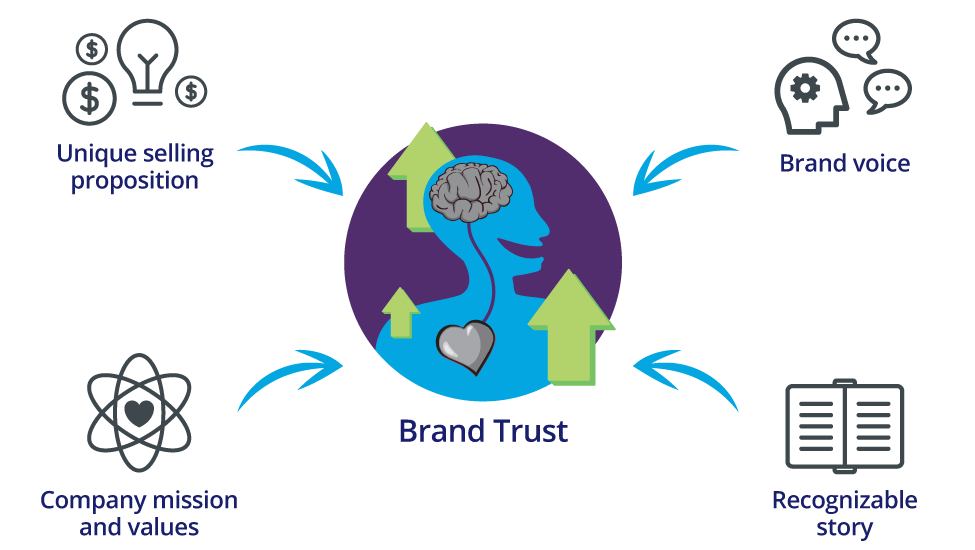Brand Trust: Why Does it Matter?

Business leaders know that brand trust is a critical part of long-term business success. So how do they go about building trust with their customers?
Your brand is a high-value asset; how you use it can mean the difference between success and failure. Building a brand that instills confidence and inspires loyalty takes careful consideration.
A brand identity is part of it. It shows the world more than just what your product can do for customers; it creates emotion, expresses your company values and builds a connection with your audience. Often, people think this is done solely through a business name, a tagline or the visual elements of a brand like a logo and graphics. These are critical pieces of your brand identity. Although their value is minimized if they aren’t part of a larger strategy to build brand trust. A distinct brand story and strong identity bring a business to life in various formats. However, they need to be amplified into a fuller brand experience that enables trust.
Providing a good product is also part of building brand trust. But in a globally competitive environment, diverse communities and changing consumer expectations, more is required to gain a trusted reputation with customers.
Brand trust also depends on delivering excellence in consistency, innovation and accountability.
Brand trust starts with consistency
Establishing a brand name with a solid reputation means ensuring every customer has a great experience with your brand. This includes your website, social channels, sales team and customer service agents. All while consistently offering exceptional products.

With a clear, unique selling proposition (USP), brand voice, and company mission and values—that connect with action—your marketing can consistently convey your brand’s authentic and recognizable story that builds brand trust. Consistency is equally important for B2B and B2C businesses regardless of whether they’re service providers or they produce consumer products.
Innovation supports brand trust
Constantly improving products and services—offering customers tangible benefits that your competitors can’t compete with—improves your brand’s reputation. For example, when your marketing describes your product as durable, and it lasts longer than your competitor’s offering, customers trust your brand.
Utilizing innovative marketing strategies is also important. Investing in current marketing communications, such as video content and professional social media profiles, and regularly engaging with your audiences builds rapport and connection. When managed correctly, your content generation program establishes your brand as current and approachable. You are seen as a business that understands its buyers, responds to feedback and provides a personable service. What better way to build trust with your audience?
Accountability when things go wrong
Trusted brands promote loyalty, encourage return customers and handle even the most awkward situations competently. Even when things go wrong, a trustworthy brand has measures in place to ensure they correct issues professionally, appropriately and as efficiently as possible.
When businesses promptly follow up with customers and their online audiences, they meet customer expectations of good company customer service. Engaging with customers where they are talking—good or bad—about your brand, responding to concerns politely and providing solutions are all characteristics of a brand that cares about its audience.
The benefits of brand trust
A brand that consumers can trust inspires a positive image of the company as a whole. That trust influences consumer choices, encourages referrals and promotes loyalty, particularly in sectors with strong competition. But building a brand, specifically a brand customers can trust, takes time.
Developing brand trust means committing to consistency, innovation and accountability. It means clearly communicating your brand promise to prospects and reliably delivering on it. This sets the foundation for rewarding personal relationships with your customers. It takes a lot of business planning and marketing strategy work, and it doesn’t happen overnight, but the brands that last and the businesses that thrive are the ones customers trust.
How does your business rank in brand trust? Mindspin’s analytic reports ensure you have the data to answer that question.
Tanja Groos, Founder and Director, Mindspin® Studio Inc.
Tanja Groos is a Founder and Strategy Director with more than 25 years of experience in branding and digital marketing. She has a strong background in developing and implementing marketing strategies, gained from collaborating with leaders and managers in consultative and service-based industries. Her efforts have tripled sales, surpassed top industry competitors online, and enhanced brand credibility for her clients.
Tanja’s award-winning branding work and marketing insights have been featured in national showcases and publications like “The Hamilton Spectator” and “Identity Solutions.” She received the Entrepreneurial Recognition Award from the Government of Canada. Tanja is passionate about helping people connect with services that enhance their lives and guiding readers in achieving their business growth dreams by explaining how marketing gets them there.
Follow Tanja on LinkedIn













Leave a Reply
Want to join the discussion?Feel free to contribute!